HubSpot CRM Review 2026: Pricing, Features, Pros & Cons
Quick summary:
HubSpot CRM offers a powerful, user-friendly platform that streamlines sales, marketing, and customer service into one seamless experience. Perfect for small to medium-sized businesses seeking growth, it provides essential tools for free, with advanced features available for those ready to invest in scaling their operations.
Imagine standing at a crossroads in your business journey, where every path leads to a different future.
To your left, a path winds through the tangled undergrowth of missed connections and lost opportunities. Straight ahead, a crowded highway buzzes with the noise of businesses racing toward uncertain destinations. But to your right, there's a path illuminated by the steady glow of innovation and clarity—this is the road HubSpot CRM promises.
In this HubSpot review, we're not just walking you through features and functionalities. Today, we’re going to show you how this tool can reshape the landscape of your business operations, making every decision and connection count.
Why You Can Trust CRM.org
We spend hours testing every CRM we write about and comparing it to other CRMs on the market to ensure our readers get the most accurate, up-to-date information. Our core mission is to deliver reliable, independent reviews to help our readers make informed buying decisions and get the most out of their purchases.
HubSpot CRM Overview: Who Should Use HubSpot?
HubSpot is one of the most popular names in the CRM industry. From startups to large enterprises, this tool serves various industries and is made to meet diverse business requirements.
This CRM is an all-in-one platform designed to enhance customer interactions and drive growth. It's renowned for its user-friendly interface, extensive functionality, and the ability to scale with businesses as they grow. But, there’s one catch…
Yes, this tool is available for free. But, if you want to use the advanced features, you will have to shell out the big bucks.
HubSpot is best for:
- Small to medium-sized businesses: Ideal for managing CRM needs affordably.
- All-in-one solution seekers: Perfect for integrating sales, marketing, and customer service.
- Inbound marketing strategies: Suited for content marketing, SEO, and social media engagement.
- Advanced analytics needs: Offers robust analytics and customizable reporting.
- Customer experience focus: Ensures a smooth customer journey from contact to support.
HubSpot is not suitable for:
- Tight budget businesses: Advanced features and higher-tier plans can be expensive.
- High customization needs: Some businesses may find HubSpot's customization limiting.
- Niche industries: May not meet specific functionalities required by specialized markets.
What is HubSpot CRM?
HubSpot is a customer relationship management platform that helps businesses of all sizes attract visitors, convert them into paying customers, obtain more leads, and close more deals. It automates various aspects of sales, marketing, and service processes.
HubSpot CRM is part of HubSpot's broader suite of tools, including the Marketing Hub, Sales Hub, Service Hub, and, more recently, the Operations Hub. These tools are built to work together seamlessly, offering a unified solution that aligns sales, marketing, and customer service efforts.
Best of all? The CRMS's core features are free, with the option to upgrade the software with all kinds of paid add-ons, making this CRM an accessible and enticing option for small to midsize businesses.
How Does HubSpot CRM Work?
In a nutshell, HubSpot CRM merges marketing functions with data from sales and other parts of your business, such as email. It keeps all the necessary sales tools and information in one central place to run more effective marketing campaigns. Repetitive tasks will be eliminated so that you can focus on the human part of your business.
After all, there are only a few CRMs on the market that have advanced features such as HubSpot’s Make My Persona, which generates personas after users answer a series of questions about their ideal customers. So rest assured that this tool will take your sales and marketing to the next level.
Whether you want to build a powerful website, create high-conversion landing pages, send personalized emails, accelerate sales, or streamline customer service, HubSpot is a complete CRM system equipped with all these tools.
This is not just a CRM for small business; even larger organizations and enterprises can benefit from it. HubSpot lends many powerful marketing tools, ranging from opened/unopened mail states and click-through rates to A/B testing and meeting scheduling.
What is HubSpot CRM Used for?
HubSpot CRM is used for managing customer relationships and streamlining business operations. It helps companies organize contacts, track sales interactions, and follow leads throughout the sales pipeline.
Additionally, HubSpot facilitates marketing efforts by automating email campaigns, managing social media, and creating content.
The platform also supports customer service activities, offering ticketing, feedback, and customer inquiries management tools, enhancing overall customer engagement and retention.
Key features of HubSpot CRM include:
- Contact & lead management: Organizes contacts in a customizable database, tracking interactions and history with each lead or customer.
- Email tracking & engagement: Notifies you when a contact opens an email, allowing for timely follow-ups.
- Pipeline management: Visualizes your sales pipeline, helping you track the status of deals and forecast revenue.
- Marketing automation: Enables the creation of email campaigns and content strategies based on user data and behaviors.
- Reporting & analytics: Offers insights into sales activities, marketing performance, and customer service efficiency.
- Integration capabilities: Can integrate with a wide range of third-party applications, enhancing its functionality and adaptability to different business needs.
HubSpot CRM Pros and Cons
Before we get into details of how each feature works, let’s weigh both HubSpot CRM pros and cons to decide if it aligns with your business’s needs.
Pros
- User-friendly, suitable for all skill levels
- Free forever plan with essential features for two users
- All-in-one platform for sales, marketing, and service
- Over 1,000 third-party integrations
- Advanced automation for campaigns and workflows
Cons
- Premium features come with high costs
- Limited customization on the free plan
- Advanced features like A/B testing are only available in higher tiers
HubSpot CRM Pros and Cons: Detailed Explanation
HubSpot is ideal for small and mid-sized businesses because of its intuitive interface, making it easy to adopt even for beginners. The free plan is a major draw, as it allows businesses to start with essential CRM features without an upfront investment. However, the free plan is available for two users only.
For growing companies, HubSpot’s all-in-one functionality streamlines sales, marketing, and service in one platform. This helps businesses automate processes like email marketing and lead generation, reducing manual tasks. Moreover, HubSpot offers over 1,000 integrations, connecting seamlessly with tools like Gmail, Outlook, and Slack, making it adaptable to a variety of workflows.
The biggest downside to HubSpot is the cost of advanced features. While the free plan is generous, the more advanced tools—like A/B testing and custom reporting—are locked behind expensive premium plans, which may be a hurdle for smaller teams. Furthermore, customization options are limited for free users, so businesses with specific needs may feel constrained until they upgrade.
Finally, while HubSpot offers many powerful tools, learning to fully utilize its automation and reporting features may require additional training time.
HubSpot Pricing: How Much Does HubSpot CRM Cost?
There are two great things about HubSpot CRM pricing - there is a free forever plan, and the number of users for each plan is unlimited. However, HubSpot CRM costs are very high if you want all the bells and whistles.
HubSpot CRM offers a flexible pricing model designed to suit businesses of all sizes, from startups to large enterprises. The pricing structure is divided into various "Hubs" (Sales, Marketing, Service, CMS, Operations, and Commerce), each catering to different business needs.
HubSpot Customer Platform is the all-in-one solution that comes with all the different hubs we mentioned, such as Marketing, Sales, Operations, and CMS hubs. The pricing for this plan is as follows:
- Free plan: $0 per month
- Starter plan: $15 per month
- Professional plan: $1,080 per month
- Enterprise plan: $4,000 per month
In addition to this option, HubSpot allows its users to purchase each hub separately or combine several hubs to create a custom plan. However, in this case, additional costs per user are applied. Here’s a brief overview of pricing for each hub.
| Plan/Hub | Sales | Marketing | Service | CMS | Operations |
| Free | Yes | Yes | Yes | Yes | Yes |
| Starter | $15/mo/seat | $15/mo/seat | $15/mo/seat | $25/mo/seat | $15/mo/seat |
| Professional | $90/mo/seat | $800/month | $90/mo/seat | $460/month | $720/month |
| Enterprise | $150/mo/seat | $3,600/month | $130/mo/seat | $1,200/month | $1,200/month |
For more information and the differences between plans, please check out HubSpot’s official pricing page.
Is HubSpot CRM free to use forever?
HubSpot offers a free version of its CRM that’s designed for businesses looking to organize their customer relationships without upfront costs. The free plan provides many core CRM functionalities, making it a great starting point, especially for smaller teams.
However, this plan is limited to up to two users, which makes it ideal for startups or small teams.
Key features of HubSpot’s free plan:
• Contact and company management: Store unlimited contacts, companies, and deals, all in one place.
• Deal tracking: Track sales pipelines and manage deals to keep an eye on your progress.
• Task management: Stay organized by assigning tasks and setting reminders for follow-ups.
• Email tracking: Get notifications when recipients open your emails or click on links.
• Live chat: Engage with customers in real-time through your website.
• Basic reporting: Access dashboards that give you an overview of key activities and metrics.
Notable limitations:
• Email marketing templates: Limited to just 3 templates.
• Documents: Only 5 documents per account.
• Email tracking: Limited to 200 notifications per month.
• Customization: Limited customization options for workflows, reports, and email templates. More advanced features like custom reporting and automation are only available on paid plans.
The free version of HubSpot provides a lot of value, but businesses that need more advanced tools—such as enhanced reporting, automation, or additional users—will need to consider upgrading to one of the paid tiers.
HubSpot CRM Review: What Are HubSpot Features?
From sales and marketing to customer service, HubSpot provides an integrated platform that simplifies processes, boosts efficiency, and fosters growth. In this section, we delve into the key HubSpot CRM features that make this tool indispensable for businesses aiming to cultivate strong customer relationships and drive success.
Ease of Use
From the get-go, HubSpot ensures a smooth onboarding process for its users. Upon logging in for the first time, we were greeted with a user guide that meticulously walked us through setting up the key components of our HubSpot account.
Adding to its user-friendly design are the small "i" bubbles scattered throughout the platform. These information icons serve as quick help guides, offering users instant explanations and insights into the functionalities of each feature with a simple click. This makes it easier to understand the full range of capabilities HubSpot offers.
Overall, the usability and UI of HubSpot CRM highlight the platform's dedication to providing a seamless and user-centric experience. With its straightforward navigation, helpful information tooltips, and simplified onboarding, HubSpot demonstrates a clear understanding of its users' needs.
Contact Management & Storage
HubSpot CRM excels in contact management and storage, providing a robust and detailed system. From the moment a lead is captured, HubSpot allows users to create comprehensive profiles for each contact.
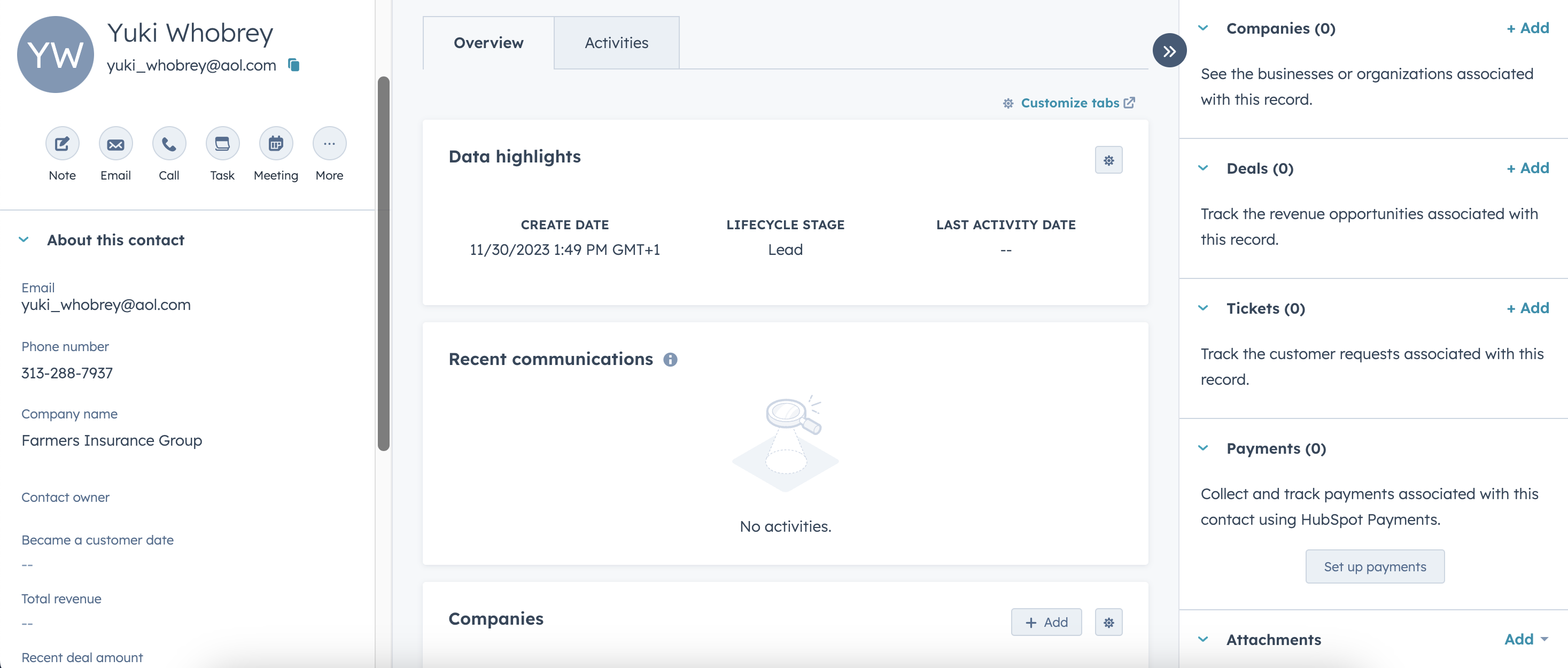 We were able to record standard contact information, assign tasks, schedule calls and meetings, and document how each lead was captured. Also, each contact comes with an activity feed that provides a timeline of interactions, showing where they are in the sales process and suggesting the next steps.
We were able to record standard contact information, assign tasks, schedule calls and meetings, and document how each lead was captured. Also, each contact comes with an activity feed that provides a timeline of interactions, showing where they are in the sales process and suggesting the next steps.
The platform's contact storage capabilities are equally impressive. The platform lets you create as many as 1,000,000 detailed contact and company records.
Adding new contacts is quickly done manually by using a prospect's email address or pulling contact information from your inbox or form submissions. The platform automatically enriches your contact records with data from over 20 million businesses.
HubSpot offers a highly detailed system for organizing and accessing contact information. You can segment contacts and create customized views using a wide array of filters, making it easier to manage large databases and target specific groups.
The flexibility to add columns and choose from dozens of fields for the contact management dashboard allows for a personalized and efficient overview, ensuring that the most relevant information is always at hand.
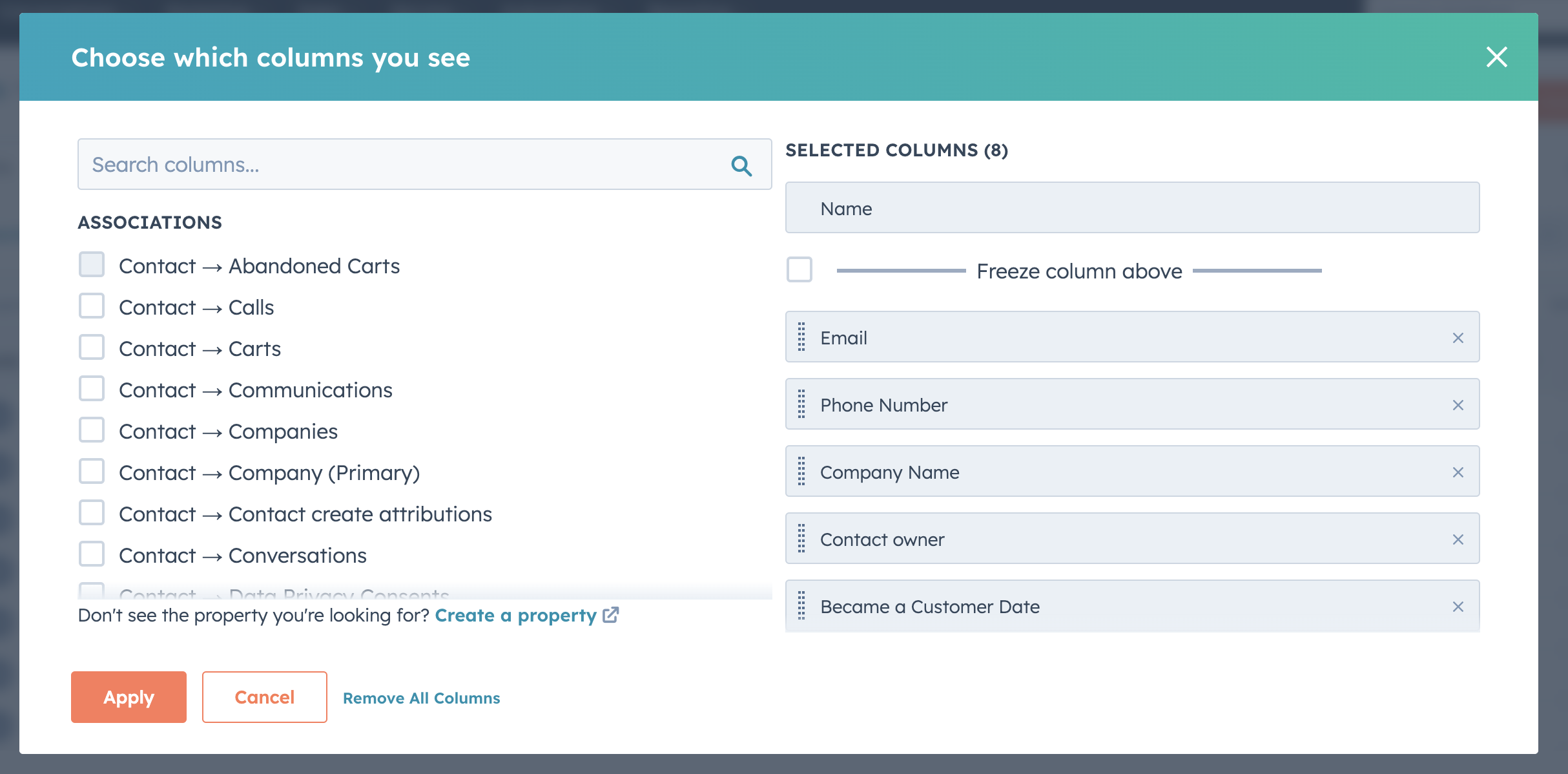
Deal Management
HubSpot CRM's approach to deal management is both visual and intuitive. The platform offers customizable sales pipelines that allow teams to track the progress of deals from inception to close visually.
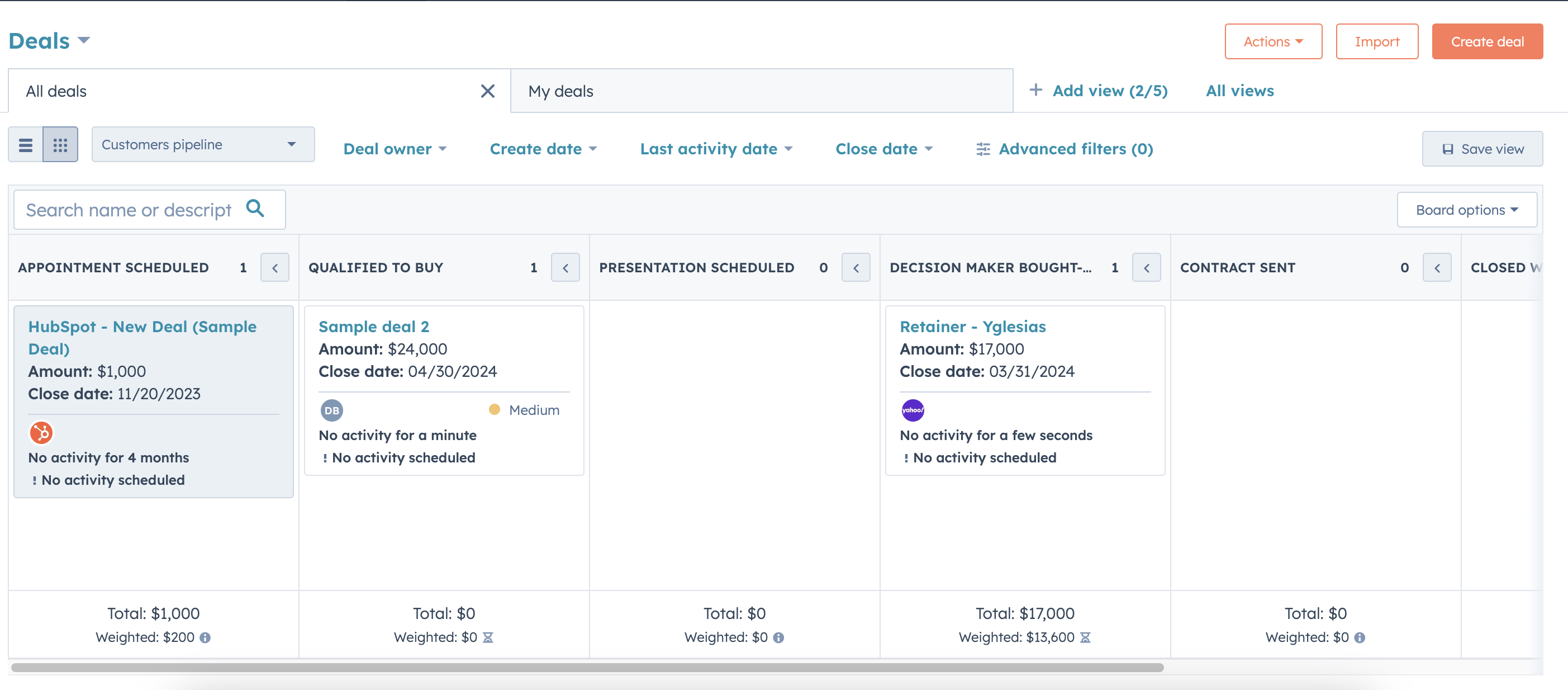 Pipelines are notably scalable and capable of accommodating a large volume of deals without sacrificing clarity or usability. The drag-and-drop functionality further enhances the user experience, enabling sales teams to move deals between stages as they progress easily.
Pipelines are notably scalable and capable of accommodating a large volume of deals without sacrificing clarity or usability. The drag-and-drop functionality further enhances the user experience, enabling sales teams to move deals between stages as they progress easily.
We were impressed by the customization options since each aspect of the pipeline can be tailored to fit the unique needs of a business. You will be able to create custom stages, insert win probabilities, and make use of various filters.
Task management within HubSpot CRM's deal management system is exceptionally robust. Tasks can be fully customized and assigned to any team member, with options to specify titles, fields, assignees, notes, and set reminders.
This level of detail and flexibility ensures that every action required to move a deal forward is captured and assigned, keeping the sales team organized and focused on their goals. All of this makes HubSpot one of, if not the best sales engagement platform.
Task Management
Task management is an effective strategy for managing your day-to-day to-dos and recurring responsibilities with minimum time and effort. Instead of toggling back and forth between several different systems to see and complete your daily tasks, HubSpot CRM lets you manage everything from one central place.
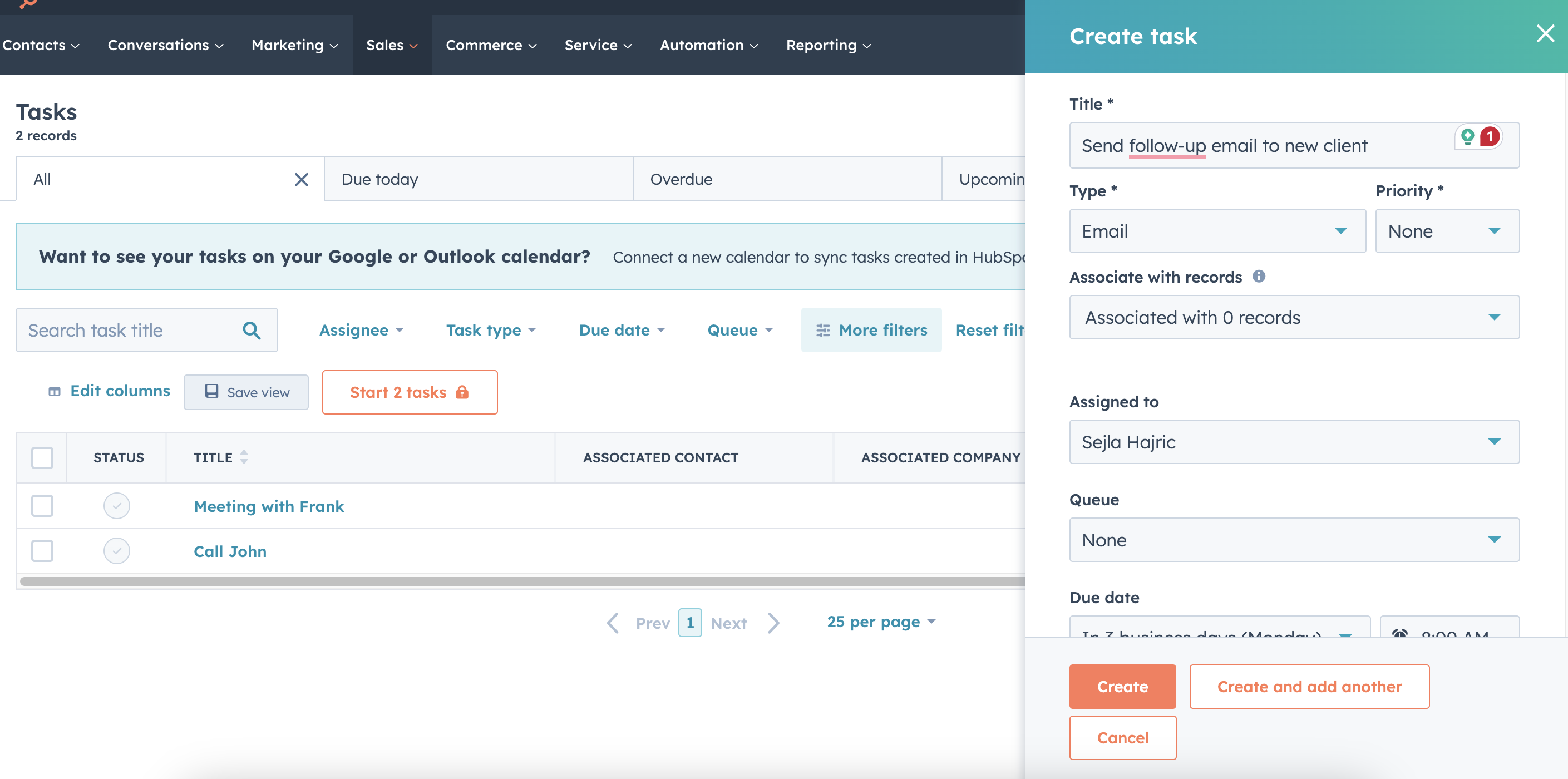 Here's how task management works in HubSpot: Go to a contact, company, or deal in the CRM. Click Create task, and that's it. Once your task is created, you can set a due date, reminder, task type, task owner, and more.
Here's how task management works in HubSpot: Go to a contact, company, or deal in the CRM. Click Create task, and that's it. Once your task is created, you can set a due date, reminder, task type, task owner, and more.
When you're ready to get working, you can start a task queue. Task queues are like a song playlist but for sales reps. Simply create a task queue based on time zone, priority, territory, or anything else. Add tasks to your queue. Press play and start running through your tasks. That's it. Bang, bang, bang, and your tasks are completed with the speed of light!
Personalized Email Sequences
Many people have found the most time-saving tool to use in HubSpot's CRM to be the Sequences tool. This tool lets you send email sequences without having to go back and schedule each individual message.
There are several types of sequences you can send to engage your prospects, including:
- Nurturing email sequence to introduce a prospect to your company.
- Engagement email sequence to build rapport with prospects.
- Conversion email sequence to ask something of your prospect.
- Follow-up email sequence to check in with a prospect after they have completed a sequence.
When you're scheduling a sequence, you can go through each email and personalize it to best connect with your prospects by using personalization tokens. Personalization tokens let you tailor the emails with contact and company details for the CRM. Meaning, you can add specific details about a contact or company to engage with them in a more human way.
Workflow Automation
HubSpot CRM's workflow automation efficiently streamlines sales and marketing tasks through event-triggered actions and sequences. This feature allows for setting up rules that automatically execute actions, such as sending a welcome email to new leads, ideal for managing follow-ups with numerous contacts.
The platform's interface is notably user-friendly, accommodating both simple and complex automations without overwhelming users. A single trigger can initiate multiple actions, enhancing engagement strategies with dynamic, responsive automation.
Sequences stand out for sales teams, enabling the scheduling of follow-up tasks and reminders and fostering personalized engagement with clients.
This distinction between broad automation and tailored sequences underlines HubSpot's commitment to versatile, accessible tools for improving productivity and customer interaction, offering scalable solutions for any business aiming to automate its processes easily.
Ad management
Another item on the list of cool features is ad management. HubSpot lets you use the CRM platform to target and track your online ad campaigns. Simply connect accounts from supported ad networks like Facebook and Google to your HubSpot account, and see which ads are generating customers. You can measure the ROI of every ad campaign and use ad data to inform your lead scoring and email marketing strategy.
The free ads tool lets you create and manage up to $1,000 ad spend/month across two connected ad accounts.
Reporting & Analytics
HubSpot CRM excels in analytics and reporting, providing comprehensive insights into sales performance, including deals won and lost, pipeline progression, sales funnel metrics, and forecasting. The platform is designed to be intuitive, ensuring that users can easily navigate and make sense of their data.
With the free account, you can get access to 90+ essential reports that can help you grow, including:
- Deal Forecast Reporting that shows you the amount of forecasted revenue by deal stage.
- Funnel Reports that help you understand how your contacts are moving through stages and how deals are progressing.
- Sales Activity Reports that monitor sales team productivity and rep performance.
You can unlock the power of fully customizable sales reports by subscribing to the HubSpot Sales Hub Professional and Enterprise paid plans.
With a variety of data visualization options such as bar charts, line graphs, donut charts, and key performance indicators (KPIs), HubSpot allows businesses to view their analytics in a way that best suits their needs, making it easier to identify trends, opportunities, and areas for improvement.
Live Chat
The polite thing to do when meeting a new person is to engage in a conversation. The same can be applied when a new visitor lands on your site. Especially in today's day and age, when buyers want instant information, being able to get in touch with them the moment they land on your site can determine whether they leave or stay.
Luckily HubSpot lets you start a live chat with your website visitors to start connecting with them and build better relationships. The CRM makes it easy to customize your chat widget to match your brand and to create targeted welcome messages for different web pages on your site. Responding to chats is also made easy via the Conversations inbox, Slack, or the HubSpot mobile app.
HubSpot's live chat fully integrates with a chatbot builder that you can use for free. Chat bots can lighten the load of your customer service team and help them qualify leads, book meetings, answer questions, and more. Best of all, conversations are automatically saved in your conversations inbox so that your entire team can get an overview of every interaction.
Communication Channels
HubSpot CRM offers a robust suite of communication channels to keep businesses connected with their customers effectively. These channels include email, social media, and phone, each integrated seamlessly within the platform for a cohesive communication strategy.
The email feature in HubSpot is particularly noteworthy, often regarded as one of the most advanced email marketing platforms among CRM tools. Users can send individual emails or craft comprehensive email campaigns. We were impressed with the extensive customization options and various email templates designed to suit different purposes and audiences.
And, of course, even when you’re sending bulk emails you can ensure your contacts receive a personalized message. Personalization is a key strength for HubSpot, with merge fields allowing for emails to be tailored to each recipient.
Last but not least, email analytics provide valuable insights into performance metrics such as open, click, and reply rates, enabling businesses to refine their email strategies over time.
Integrations
There are few CRMs out there that offer as powerful integration capabilities as HubSpot does. When we opened the app marketplace for the first time, we were impressed to see that there are over 1,000 integrations available. The CRM integrates with powerful tools like MailChimp, Salesforce, Pipedrive, Zendesk, Zoho CRM, Wistia, and many more.
Finding the right integration within HubSpot's marketplace is a breeze, thanks to an intuitive search bar. Users can simply type in the name of the app they're looking for, making the process quick and efficient.
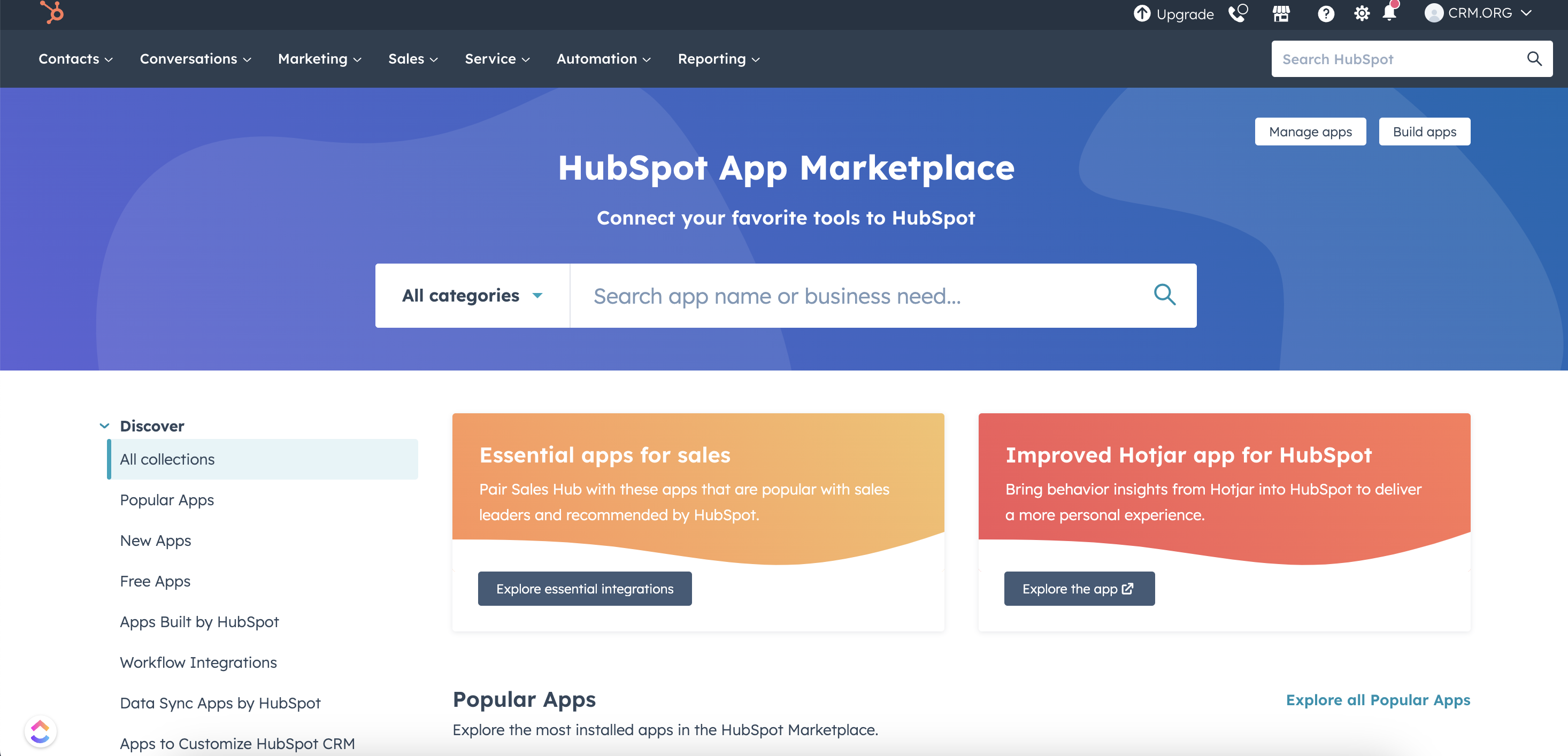 For those interested in exploring the available options, the marketplace is organized into categories on the left side of the interface. This categorization allows you to discover new apps, free apps, and recommended apps, or to browse through specific categories like marketing, sales, productivity, and customer service.
For those interested in exploring the available options, the marketplace is organized into categories on the left side of the interface. This categorization allows you to discover new apps, free apps, and recommended apps, or to browse through specific categories like marketing, sales, productivity, and customer service.
Last but not least, HubSpot's compatibility with Zapier significantly broadens its integration capabilities. Zapier acts as a bridge between HubSpot and thousands of other apps, enabling users to automate workflows between HubSpot and platforms that may not be directly available in the HubSpot marketplace.
How HubSpot Stacks Against Its Competitors?
Not sure that HubSpot CRM is the real deal for you? Check out these HubSpot alternatives:
Pipedrive - Streamlined Sales Focus
Pipedrive emphasizes simplicity and efficiency in sales pipeline management, contrasting with HubSpot's all-in-one approach. While HubSpot offers comprehensive marketing, sales, and service tools, Pipedrive caters to businesses seeking straightforward, sales-focused functionality.
Zoho CRM - Versatile Business Solutions
Zoho CRM offers a broad suite of business tools that extend beyond CRM, including email, project management, and more, positioning it as a versatile competitor to HubSpot. Both platforms are great for businesses looking for an integrated approach, but Zoho might appeal more to those needing a wider range of business applications.
Salesforce - Enterprise-Level Scalability
Salesforce stands out for its deep customization and scalability, targeting larger enterprises with complex CRM needs, compared to HubSpot's appeal to a broader range of business sizes. While HubSpot focuses on user-friendliness, Salesforce offers extensive features and customization options for sophisticated CRM strategies.
HubSpot CRM complaints & praise (info from real Hubspot CRM customer reviews)
Upon reading a range of HubSpot CRM reviews by customers, we can conclude the following:
Customers seem to love the lead generation tools.
Many marketing and sales teams seem to be fans of the platform's lead generation features, letting them collect leads from social media platforms like Facebook and Linkedin, and Google. They use the application to create a database of prospects and clients, understand where each prospect is in the sales process, and build more effective sales strategies.
HubSpot CRM seems to be constantly evolving.
Customers love the extensive set of tools HubSpot offers. From email scheduling to live chat, there are plenty of useful tools to support a growing business. Customers' favorite part is that HubSpot seems to be continually evolving. They listen to customers' feedback and continuously come out with new features.
It has real limits to its function and flexibility.
Enterprise companies have run into limitations with the platform, mostly involving integrations with other tools. Although they believe HubSpot's marketing features are phenomenal, their experience tells that the platform has real limits to its function and flexibility. In other words, it doesn't scale to larger enterprise companies with more extensive needs.
Customers seem to see a return on investment.
One client who has migrated from Pipedrive to HubSpot reports an increase in the sales team by 15%. Another customer reports an increase in sales of approximately 50% throughout the company.
Not the ideal CRM for niche businesses.
Businesses that are in a niche industry have run into some limitations. Their needs require plenty of customization, which they haven't found with HubSpot.
Reviews confirm the fact that HubSpot CRM is best suited for small businesses.
The platform seems to have all the tools small businesses need to grow their business. The free version is perfect for smaller sales teams, integrates well with 200+ tools, and has decent email marketing functionality.
Lack of A/B testing functionality.
If you want to take advantage of the A/B testing feature, you’ll have to subscribe to HubSpot's Professional package in the Marketing Hub, which runs at $800 per month.
HubSpot CRM is a top pick if you're not tech-savvy.
Reviews make it clear that customers who don't understand computer code or have experience maintaining web pages find the HubSpot CRM very user-friendly. You don't have to have any background in technology to find your way around all of the features the platform offers.
Customers with more complex sales needs find Salesforce to be a better alternative.
Although two great options, users who need an enterprise-wide ecosystem in one platform think Salesforce may be the better option.
HubSpot reminds you to follow up with prospects, and that's a plus.
In salespeople's words, it's challenging to remember all interactions and communications on your own. But with the HubSpot CRM, sales reps can keep track of their interactions with prospects, which includes notes, emails, calls, and meetings. Being able to see previous interactions reminds them where they left off and whether they need to follow up.
CRM, marketing, and support into one single platform.
Customers love they can have their CRM, marketing, and support software combined into one single platform. Once all three teams learn how to use the platform, they'll be able to collaborate more effectively and work faster.
Some customers believe HubSpot has lost their original selling point.
Disappointed ex-loyal customers feel betrayed by HubSpot's pricing plans. Many of the platform's more powerful features are out of reach to small businesses, and they got the impression that HubSpot is only concerned with their enterprise clients. Hubspot's original selling point was their all-in-one functionality, but it seems like this is now only available to companies with deeper pockets.
Their technical support is top-rated.
According to customer reviews, Hubspot's technical customer support team is swift to help teams get their processes in order and is easily accessible when you run into a problem.
Is HubSpot CRM for You? Key Takeaways
HubSpot CRM is a versatile tool suitable for a wide range of businesses, from startups to larger enterprises. Its user-friendly interface, combined with a rich set of features across sales, marketing, and customer service, makes it a compelling choice for those seeking to streamline their operations and foster growth.
While the free version offers a solid foundation, accessing more advanced features does require investment, which might not suit all budgets.
For businesses considering HubSpot, we recommend evaluating specific needs against HubSpot's offerings, taking advantage of the free version to explore its capabilities, and considering how it aligns with your growth strategies.
HubSpot FAQs
Why is HubSpot so popular?
HubSpot has gained popularity due to its comprehensive and user-friendly platform that integrates various aspects of marketing, sales, and customer service. HubSpot is known for its robust free CRM offering that provides essential tools without cost, making it accessible to small businesses and startups.
Is HubSpot better than Salesforce?
Choosing between HubSpot and Salesforce ultimately depends on your business needs and preferences. HubSpot excels in user-friendliness and is ideal for those seeking an integrated marketing solution with less complexity. Salesforce is tailored for larger enterprises and offers powerful features for complex CRM requirements. The final choice depends on your organization's scale, budget, and needs.
How much does HubSpot cost per month?
HubSpot offers a range of pricing tiers, starting with a free plan that includes basic CRM features. Paid plans begin at approximately $15/month/seat for the Starter package, with costs significantly increasing for the Professional and Enterprise plans. These prices vary depending on the specific hubs and functionalities you choose and can go up to $4,000/month.
Should I use HubSpot CRM?
Yes, if you're looking for a comprehensive CRM platform that combines ease of use with a wide range of features to support sales, marketing, and customer service. HubSpot is particularly beneficial for small to medium-sized businesses seeking to enhance their customer relationship management without a steep learning curve.




